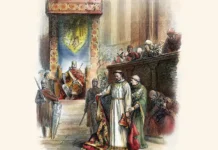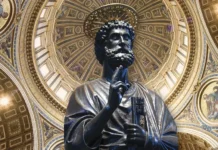In the wonderful universe of the Communion of Saints, the least significant of our actions, done in charity, redounds in profit for all the faithful, while every sin weighs negatively in this communion.
Despite the progress of modern science, the human body continues to remain a mystery. As we deepen our understanding of its laws and workings, new discoveries are made and previously unknown wonders are identified that awaken admiration.
Today, for example, we are amazed by the spectacular efficiency of the human immune system. What scientist can provide a precise explanation of the extraordinary agility, intricacy and precision of our nervous system? And let us not forget the tireless work of the heart, which, with its rhythmic beating, ceaselessly pumps blood to the whole organism.
The human body is the best image at reach to illustrate a rich and profound truth of our Faith: The Communion of Saints. While we reaffirm it every time we recite the Creed, perhaps we rarely ponder this reality that transcends our earthly and temporal sphere and raises us beyond our everyday concerns.
Let us, then, peruse some excerpts from the letters of St. Paul, and consider the reflections of a famous Dominican preacher, Jacques-Marie-Louis Monsabré, OP, as well as examine the teachings of the Second Vatican Council and some of the recent Popes, in order to delve further into this fascinating topic.
Christ, head of the Mystical Body of the Church
As the Apostle teaches, there is an intimate relationship between the members of the Holy Church. “We, though many, are one body in Christ;” (Rom 12:5)—the Mystical Body of Christ. And like every properly constituted body, it has a head, “from whom the whole body, nourished and knit together through its joints and ligaments, grows with a growth that is from God” (Col 2:19).1 The strength and vitality of the entire body flows from Christ, “the head of the body, the Church” (Col 1:18).
The Redeemer Himself explained this reality in the parable of the vine and the branches: “I am the true vine, and My Father is the vinedresser. Every branch of Mine that bears no fruit, He takes away […]. As the branch cannot bear fruit by itself, unless it abides in the vine, neither can you, unless you abide in Me” (Jn 15: 1-4).
“You have put on Christ”
All the baptized, diverse as they may be by race, nationality or class, are part of this Body. The Apostle teaches us: “For as many of you as were baptized into Christ have put on Christ. There is neither Jew nor Greek, there is neither slave nor free, there is neither male nor female; for you are all one in Christ Jesus” (Gal 3:27-28). In the Epistle to the Ephesians, St. Paul insists on the necessity of this union, “eager to maintain the unity of the Spirit in the bond of peace. There is one body and one Spirit, just as you were called to the one hope that belongs to your call” (Eph 4: 3-4).
This important teaching was embodied in the customs prevailing in the early Church, as recounted in the Acts of the Apostles: “Now the company of those who believed were of one heart and soul, and no one said that any of the things which he possessed was his own, but they had everything in common” (Acts 4:32).
The relationship between the members of the Mystical Body, so different amongst themselves, was governed by charity and by the spirit of communion. All of them, from the successors of the Apostles to the humblest widow, melded in a harmonious coexistence that in no way aimed to destroy the charisms or superiorities of the more gifted, nor permit the lesser ones to be scorned. As the Apostle of the Gentiles wrote, “For by one Spirit we were all baptized into one body—Jews or Greeks, slaves or free—and all were made to drink of one Spirit. For the body does not consist of one member, but of many. […] God arranged the organs in the body, each one of them as He chose. If all were a single organ, where would the body be? As it is, there are many parts, yet one body “(1 Cor 12:13-14,18-20).

The three states of the one and undivided Church
This Mystical Body, however, is made up not only of the visible Church, on its earthly pilgrimage. As Fr. Monsabré explains, this “is but a portion of the vast assembly to which the effects of Redemption apply in different manners, which also includes the Church Triumphant and the Church suffering.”2
The Church Triumphant is that portion of the Mystical Body that already enjoys eternal blessedness, the final end of our journey. From their place before the throne of God, this assembly of the Elect pray continuously for their brethren who are still in pilgrimage on earth.
The faithful suffering in Purgatory make up the Church Suffering, expiating for their faults and purifying their spiritual sights to meet God.
And we who struggle in this valley of tears, to win the crown of glory, through the infinite merits of Our Lord Jesus Christ, form the Church Militant (Ecclesia Militans), according to the classical term, which emphasizes the need to fight against sin and evil inclinations during this life.
These three states of the one and undivided Catholic Church are closely united, as the Second Vatican Council stressed: “Until the Lord shall come in His majesty, and all the Angels with Him (cf. Mt 25:31) and death being destroyed, all things are subject to Him (cf. I Cor 15:26-27). Some of his disciples are exiles on earth, some, having died, are purified, and others are in glory, beholding ‘clearly God Himself, triune and one, as He is;’ but all in various ways and degrees are in common in the same charity of God and neighbour, and all sing the same hymn of glory to our God. For all who are in Christ, having His Spirit, form one Church and cleave together in Him (cf. Eph 4: 16).”3
Heavenly blessedness comes down to us
To describe the relationship between the members of the Church Militant and the Church Triumphant, Fr. Monsabré uses an expressive allegory:
“In relation to the Church Triumphant, the Church Militant is in a condition similar to that of an army fighting far away from its country; a country where everything is orderly, restful and prosperous. How could this army fail to keep its eyes trained on its homeland, from which it expects to receive the resources and reinforcements needed to successfully complete its arduous mission? And, conversely, could that homeland, indulging in selfish enjoyment, be indifferent to the labours and sufferings of its valiant sons who are fighting for the national honour? Could there possibly fail to be, between the army and the homeland, an intimate solidarity, expressed by a confident and generous exchange of prayers and solicitude, of wishes and favours, until the day when the victorious soldiers parade triumphantly through the throngs of their fellow citizens whose hearts had been with them in that foreign land?”4
Thus, the pilgrim Church on earth implores and awaits the efficacious assistance of the Heavenly Homeland, so as to one day be able to triumph with her. It would be a serious mistake to think that, in eternal glory, the Blessed forget their earthly brethren. On the contrary, “they know of our needs more than we do, and even before our prayer reaches them, they have been prepared by God to hear and answer it.”5
This certainty of constant aid should encourage us and even fill us with joy. For we know that, amidst the difficulties of everyday life, we have intercessors watching over us at every moment. “Thus, by their brotherly interest, our weakness is greatly strengthened” teaches the Second Vatican Council.6

Objects of both heavenly and earthly solicitude
Meanwhile, as the pilgrim Church benefits from the intercession of the blessed, it also has a responsibility and an obligation to pray for those who have fallen asleep in the peace of the Lord, but do not yet enjoy the beatific vision—the souls of the faithful departed, in Purgatory.
“Castaways snatched from the fury of a sea rife with shipwrecks, candidates to the heavenly hosts, their faces bearing deep sorrow and serenity—marks of both the Church they have just left and the one they will enter—the members of the Church Suffering are objects of both heavenly and earthly concern. Like the unfortunate Job, they cry out to us: “Have pity on me, O you my friends!” (Job 19:21). We pray for them. Joining their powerful voice to ours, the Elect offer—from the treasury of divine mercy that enriches their merits—consolation, appeasement, and liberation.”7
Laws governing this relationship
This symphony, produced by the exchange of goods and intercession between the Church Triumphant, Militant and Suffering, is governed by two laws that are closely linked to the Mystical Body’s nature.
The first is the Law of Unity: “The greater the perfection of a unit, the easier, more prompt and abundant will be the communication of goods,” explains Monsabré.8 This principle, so obvious in the natural order, applies even more fittingly to the supernatural order. Thus, the more we are united with Christ and with the Church, the more we will benefit from the Communion of Saints.
The Dominican theologian formulates the second law in the following way: “Jesus Christ, the principle of unity, maintains in His dependence, the circulation of spiritual goods communicated to each of the members of His Mystical Body.”9 For regarding the Church, as the Catechism teaches, “not only is she gathered around Him, she is united in Him, in His body.”10
This being the case, there is only one appropriate course of action: to seek to be ever more closely united to the Divine Saviour and to His Church through prayer, striving to live according to the Commandments and frequenting the Sacraments—especially the Eucharist, in which we receive Our Lord Jesus Christ Himself, source of all graces.
Communion of spiritual goods
The Church is the assembly of all the saints: those of Heaven, Purgatory and Earth. “The Communion of Saints is the Church,”11 states the Catechism. It goes on to explain that “the term ‘Communion of Saints,’ therefore, has two closely linked meanings: communion ‘of holy things (sancta)’ and ‘among holy persons (sancti).’”12 Continuing, it adds: “Sancta sanctis! (‘God’s holy gifts for God’s holy people’) is proclaimed by the celebrant in most Eastern liturgies during the elevation of the holy Gifts before the distribution of Communion. The faithful (sancti) are fed by Christ’s holy Body and Blood (sancta) to grow in the communion of the Holy Spirit (koinonia) and to communicate it to the world.”13
What are these “holy things” that exist in the life of the Mystical Body? The Catechism points out communion in the Faith, of the Sacraments, of earthly goods and of charity.14 And Fr. Monsabré summarizes, these goods in three categories: good works, graces, and merits.15
Recourse to the prayers of the saints
Graces—understood as the favours and benefits provided by supernatural life—circulate via intercession, explains the learned Dominican.
Indeed, the Second Vatican Council teaches: “It is supremely fitting, therefore, that we love those friends and coheirs of Jesus Christ, who are also our brothers and extraordinary benefactors, that we render due thanks to God for them and suppliantly invoke them and have recourse to their prayers, their power and help in obtaining benefits from God through His Son, Jesus Christ, who is our Redeemer and Saviour. For every genuine testimony of love shown by us to those in Heaven, by its very nature tends toward and terminates in Christ who is the crown of all saints, and through Him, in God Who is wonderful in his saints and is magnified in them.”16
The Treasury of the Church
The circulation of graces throughout the whole Church is complemented, in a sense, by another set of goods—merits. It is true that, inasmuch as merits are ordered to eternal blessedness, they are strictly personal. Nonetheless, the merits springing from the practice of good works are always accompanied by an atoning virtue, capable of reducing the debt of the penalties imposed by divine justice. The more arduous are our good works, the more charged they are with atoning virtue. And the more we progress in the ways of good, the more this expiatory power flowing from our actions, of which we no longer have personal need, becomes communicable to others.

Fr. Monsabré illustrates this doctrine with a vivid example: “Two men are equally devoid of goods, but one of them is deeply in debt, of which the other is entirely free. Both set to work with the same zeal, spending their days, their energies, and their lives in it. Both are rewarded with the same pay. Having reached the end of their efforts, are the two are equally rich? No. The first was merely freed of his debts; the second has the entire fruit of his work; and from it, he may generously benefit the needy.”17
These two men represent the sinner and the saint. Having only to atone for small faults, the saint accumulates merits that may be applied for the benefit of those in debt. This merit, considered as a whole, is called the Treasury of the Church.
Within this treasury, the infinite merits of our Lord Jesus Christ are placed at our disposal, for “though He was rich, yet for your sake He became poor, so that by His poverty you might become rich” (2 Cor 8:9).
The obligation of giving good examples
Graces and merits are accompanied by a third type of goods: good works, which are placed into circulation in the Communion of Saints by means of example and imitation.
In the first place, we have the supreme example of Christ who became man and walked the path that He pointed out to us. Below His example, but far above that of all the Blesseds, is Our Lady’s. Finally, there is that of the saints, true stars that indicate the way toward heavenly glory.
However, this last group of gifts in the Communion of Saints implies a commitment from all members of the Mystical Body; we also have the obligation to set a good example. Our whole lives should be a reflection of what we believe. Therefore, our actions are far more important than we may imagine. For besides increasing the Treasury of the Church, they should serve as a powerful stimulus for others to do good.
We are not alone on the road leading to Heaven
“Oh! What a wonderful world is that of the Communion of Saints!”18 Well could we make this exclamation of Pope Paul VI our own, for the thought of this truth of our Faith opens a magnificent vista before us. The least significant of our actions, done in charity, redounds in profit for all the faithful, living or dead; while, conversely, every sin weighs negatively in this communion.19
As St. Paul instructs us: “None of us lives to himself, and none of us dies to himself” (Rom 14:7). And he further affirms: “If one member suffers, all suffer together; if one member is honoured, all rejoice together” (1 Cor 12:26).
Therefore, we are not alone on the road leading to Heaven; the saints accompany us in our difficulties. Let us strive to benefit more and more from this magnificent treasure, without forgetting the duty that we also bear toward the Church. Then we may proclaim, not only with our lips, but chiefly with our lives: “I believe in the Communion of Saints!”◊







